|
|
|
Sort Order |
|
|
|
Items / Page
|
|
|
|
|
|
|
| Srl | Item |
| 1 |
ID:
163921
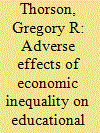

|
|
|
|
|
| Summary/Abstract |
One of the most important economic trends of the past 30 years has been the escalating levels of within-country income inequality. Much of the developed world is currently experiencing large increases in income inequality. Indeed, income inequality in the United States now exceeds the previous highs of the 1930s. Recent research has found that increases in income inequality can produce a wide variety of societal ills. This article examines the effects of economic inequality on educational outcomes. Drawing on data provided by the World Bank and the Organisation for Economic Co-operation and Development (OECD) from 2000 through 2015, we find that a country’s level of economic inequality has large, negative effects on its student academic achievement. The effect sizes are largest in math. We examine a variety of potential solutions to lessen within-country economic inequality.
|
|
|
|
|
|
|
|
|
|
|
|
|
|
|
|
| 2 |
ID:
140745
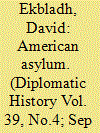

|
|
|
|
|
| Summary/Abstract |
In 1939–1940, internationalists, with the approval of the Roosevelt administration, campaigned to transplant key technical organs of the League of Nations to the United States to aid in postwar planning and prevent fascist forces in Europe from co-opting the institution.
|
|
|
|
|
|
|
|
|
|
|
|
|
|
|
|
| 3 |
ID:
145481
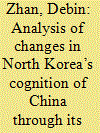

|
|
|
|
|
| Summary/Abstract |
This paper compares the coverage of China, Russia and the United States by the Korean Central News Agency(KCNA)from October 1, 2013, to February 29, 2016. It also verifies the results by the Rodong Sinmun (RS) coverage of the three countries from January 1, 2015, to February 29, 2016. The analysis reveals that the North Korean media has reduced its coverage of China significantly and constantly since November 2013, and that the media have turned to reporting negatively on China, with almost no positive coverage since July 2014. Considering that KCNA and RS are North Korea’s official mouthpieces, this change may indicate that North Korea’s leadership has changed its cognition of China from a friendly country to an unfriendly country, if not a quasi-hostile country.
|
|
|
|
|
|
|
|
|
|
|
|
|
|
|
|
| 4 |
ID:
162793
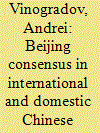

|
|
|
|
|
| Summary/Abstract |
This article examines the approaches of foreign researchers to the model of the Beijing Consensus formulated in 2004 by Joshua Cooper Ramo, including those of members of different Chinese schools of thought. We analyze the question is analyzed of whether China, in promoting the ideas of globalization, is ready to propose a realistic alternative to the Washington Consensus, or to reproduce the successful experience of its own development in other developing countries. The model of the Beijing Consensus is examined in the context of the change in global leadership.
|
|
|
|
|
|
|
|
|
|
|
|
|
|
|
|
| 5 |
ID:
147394
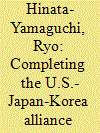

|
|
|
|
|
| Summary/Abstract |
Given the fluid nature of the security environment in the Asia-Pacific, a trilateral security partnership among the United States, Japan, and the Republic of Korea (ROK) is essential to enhance stability in the region. Yet both Japan and the ROK are currently experiencing transitions, as well as facing strategic perception gaps and political difficulties in the bilateral relationship that need to be reconciled. The purpose of this paper is to examine the prospects and issues in establishing a Japan-ROK security partnership to the U.S. alliance triangle. The paper promotes a capability-based cooperation framework for the United States, Japan, and the ROK, focusing on the strategic and operational dimensions that would effectively deal with the security risks in the Asia-Pacific region and beyond. The paper will first outline the developments in Japan-ROK security relations, and then look at the constraints and restraints in the bilateral relations. Next, the paper will assess the political framework needed to facilitate cooperative ties between Japan and the ROK. Then the paper will propose the criteria and viable options to shape the strategic and operational framework for a Japan-ROK partnership. The paper will conclude by arguing that a Japan-ROK partnership is essential in completing the alliance triangle with the United States to serve as the lynchpin of security in the Asia-Pacific.
|
|
|
|
|
|
|
|
|
|
|
|
|
|
|
|
| 6 |
ID:
163914


|
|
|
|
|
| Summary/Abstract |
The weakness of the antigun lobby in the United States is attributed to the “collective action problem” of trying to mobilize “free riders” behind a public purpose. But the Coalition for Gun Control emerged in Canada to successfully lobby for the Firearms Act of 1995. If the “collective action problem” is not limited to the United States, then are its effects “mediated” by political culture? To address this research question, we content analyze (1) media coverage, (2) party platforms, (3) presidential, and (4) ministerial rhetoric. Three frames represent “restrictive” gun policies that ban or regulate firearms, “punitive” gun policies that penalize the person for the unlawful use of firearms, or “lenient” gun policies that encourage gun ownership and gun rights. Marked differences in framing the gun debate help explain why an antigun coalition emerged in Canada but not the United States.
|
|
|
|
|
|
|
|
|
|
|
|
|
|
|
|
| 7 |
ID:
153628
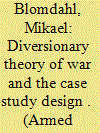

|
|
|
|
|
| Summary/Abstract |
This article examines President Clinton’s decisions to launch military actions against Iraq in June 1993 and Kosovo in 1999. This study represents an attempt to test the descriptive accuracy and further developing the diversionary theory of war. Using a qualitative framework for diversionary use of force developed by another researcher, Ryan C. Hendrickson, this research examines and compares the two cases in order to determine whether or not these strikes appear to be diversionary in nature. This article generally suggests that empirical support for the diversionary argument in these cases is “mixed” but has more validity in the actions against Iraq. Two proposals to further develop qualitative tests for diversionary use of force are advanced.
|
|
|
|
|
|
|
|
|
|
|
|
|
|
|
|
| 8 |
ID:
156293
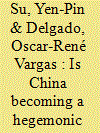

|
|
|
|
|
| Summary/Abstract |
After the Chinese Communist Party’s 18th Party Congress was held in the fall of 2012, frequently asked questions were: Is Xi Jinping able to rein in the Chinese People’s Liberation Army (PLA) and what is the state of Chinese party-military relations? What are the implications of this status for the PLA in China’s Taiwan policy-making? What is the potential impact of Taiwan’s leadership transition on China’s Taiwan policy and on the PLA’s role?
This author argues that through a stick and carrot approach, Xi has become the leader of China, and has been able to rein in the PLA. His proactive and assertive approach in the context of China’s growing capabilities has empowered him to control the discourse of Taiwan policy. In these circumstances, the PLA will continue to be one joint actor within the relevant apparatus executing Taiwan policy without its own agenda. Uncertainty as a result of the ruling party rotation in Taiwan is unlikely to change the PLA’s role.
|
|
|
|
|
|
|
|
|
|
|
|
|
|
|
|
| 9 |
ID:
158011


|
|
|
|
|
| Summary/Abstract |
Based on newly declassified archival documents, the aim of this study is to contribute to an improved understanding of the evolution of the non-proliferation regime through an examination of US and French nuclear cooperation agreements in the latter half of the 1970s. The four pledges of nuclear assistance examined – US assistance to Egypt and Israel, and French assistance to Pakistan and South Korea – failed to materialise by the end of the decade. Why did that happen? What caused the four pledges to fail? We find that the 1974 Indian nuclear explosion and the emergence of opposing domestic factions on the nuclear front in the supplier states generated major changes in US and French nuclear export policies, and also contributed to the development of a collaborative partnership between the two competing nuclear exporters, on the other.
|
|
|
|
|
|
|
|
|
|
|
|
|
|
|
|
| 10 |
ID:
159315
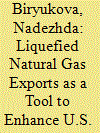

|
|
|
|
|
| Summary/Abstract |
As a result of the "shale revolution," the U.S. could emerge as a liquefied natural gas (LNG) exporter. APR countries, major LNG importers - Japan and South Korea included, became a premium market for its commercialization. Due to economic factors of U.S. LNG projects, the U.S. has determined the trend of LNG trade development in the region, and its political leaders intend to use the exports for providing "energy dominance" of the U.S. The aim of this article is to appreciate the prospects of transforming LNG exports into a tool of economic and political influence of the U.S. in the APR.
|
|
|
|
|
|
|
|
|
|
|
|
|
|
|
|
| 11 |
ID:
167635
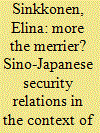

|
|
|
|
|
| Summary/Abstract |
This paper analyses the evolution of Sino-Japanese rivalry in the security sphere concentrating on the Chinese perspective, and placing it within the wider context of complex interstate rivalry between China, Japan and the United States. From a theoretical viewpoint, this research contributes to the literature on interstate rivalry from multiparty perspective, which has been overlooked in existing research. China–Japan–US complex interstate rivalry includes elements of positional, spatial and ideological rivalry simultaneously. When rivalries mix two or more rivalry types, they become more difficult to resolve. The two broad trends of China’s military build-up and deepening US–Japan alliance evolve in tandem intensifying rivalry dynamics and increasing positional elements of rivalry. There are many indications on various levels that for China, controlling Japan’s international ambitions has become less important and more attention is paid to ways in which Japan helps the United States in reaching its objectives in Asia through their alliance agreement. The cases analysed to display complex interstate rivalry include the Taiwan question, territorial disputes in the East and South China Seas, and the North Korean nuclear issue.
|
|
|
|
|
|
|
|
|
|
|
|
|
|
|
|
| 12 |
ID:
173157
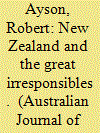

|
|
|
|
|
| Summary/Abstract |
New Zealand's willingness to call out irresponsible great power behaviour is a major test for Jacinda Ardern’s promise that her government will stand up for its values internationally. In fact, New Zealand has been weaker on Russia’s irresponsibility in the Ardern era than it was under the National Party-led governments of John Key and Bill English. The situation is reversed, however, for New Zealand's response to irresponsible international behaviour by China from the South China Sea to cybersecurity and human rights. Ardern’s commitments to international tolerance and cooperation have also made for a stronger response to the divisive turn in US foreign policy under Donald Trump. But there has also greater inconsistency in New Zealand's positioning since Ardern became Prime Minister in late 2017. Among the explanations for these trends is the Labour Party’s agreement to hand the foreign affairs and defence portfolios to the New Zealand First Party, which has amplified the contribution to New Zealand policy pronouncements by the Deputy Prime Minister Winston Peters.
|
|
|
|
|
|
|
|
|
|
|
|
|
|
|
|
| 13 |
ID:
155089
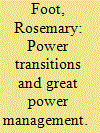

|
|
|
|
|
| Summary/Abstract |
What kind of challenge did a rising Japan in the 1970s and 1980s pose to the United States, and how does that differ from the challenge that China has posed to US primacy in East Asia since the early 2000s? This article compares and contrasts US responses to these two shifts in relative power, in the process aiming to elucidate how changes that portend a power transition are understood and dealt with and how great powers manage the security order at times of disruption. In these respects, the article contributes to the empirical understanding of why some power transitions do not result in conflict given the tools available to great powers to manage relations at times of stress.
|
|
|
|
|
|
|
|
|
|
|
|
|
|
|
|
| 14 |
ID:
188939


|
|
|
|
|
| Summary/Abstract |
This paper makes use of interdependence theory to analyse the historical development of the economic relations between the GCC countries and the United States. The focus will be on oil and arms trade between the GCC countries and the United States. The results show that while the military and security dependence of the GCC countries on the United States remains relatively intact, the dependence of the United States on the natural resources of the GCC region has decreased. In light of this, the paper suggests that the historical interdependence between the GCC countries and the United States has recently evolved into a unilateral dependence and that the GCC countries’ natural resources are directed towards Asian countries.
|
|
|
|
|
|
|
|
|
|
|
|
|
|
|
|
| 15 |
ID:
162792
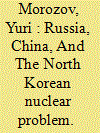

|
|
|
|
|
| Summary/Abstract |
This article considers the future development of North Korea's nuclear missile program, along with the possibility of a US-DPRK confrontation on the Korean Peninsula. We describe the former's influence on the national interests of Russia and China, and on the situation in the region. We emphasize that the threats stemming from North Korea's nuclear missile program and strategy in the region could be curbed through joint efforts by Russia and China, with support from the United Nations and the world community.
|
|
|
|
|
|
|
|
|
|
|
|
|
|
|
|
| 16 |
ID:
153259
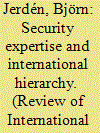

|
|
|
|
|
| Summary/Abstract |
Many states partially relinquish sovereignty in return for physical protection from a more powerful state. Mainstream theory on international hierarchies holds that such decisions are based on rational assessments of the relative qualities of the political order being offered. Such assessments, however, are bound to be contingent, and as such a reflection of the power to shape understandings of reality. Through a study of the remarkably persistent US-led security hierarchy in East Asia, this article puts forward the concept of the ‘epistemic community’ as a general explanation of how such understandings are shaped and, hence, why states accept subordinate positions in international hierarchies. The article conceptualises a transnational and multidisciplinary network of experts on international security – ‘The Asia-Pacific Epistemic Community’ – and demonstrates how it operates to convince East Asian policymakers that the current US-led social order is the best choice for maintaining regional ‘stability’.
|
|
|
|
|
|
|
|
|
|
|
|
|
|
|
|
| 17 |
ID:
173955
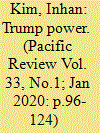

|
|
|
|
|
| Summary/Abstract |
China has started choking off the flow of financial resources entering North Korea by blocking North Korea’s export of natural resources and other industrial products since early 2017. What has pushed Beijing to enforce sanctions strictly, in contrast with its loose administration of sanctions in the past? By employing principal-agent theory, this article shows that Beijing’s conformity to sanctions depends on China’s own need and the degree of pressure from Washington for sanctions enforcement. Until the end of the Obama administration, China did not act meaningfully for sanctions enforcement, as the pressure from Washington was weak and North Korea’s nuclear capabilities remained limited. Now, international contexts have dramatically changed. Beijing feels a need to discipline Pyongyang with sanctions as Pyongyang has become a de facto nuclear weapon state. The new Trump administration in Washington has also pushed Beijing to do more to rein in Pyongyang’s weapon programs.
|
|
|
|
|
|
|
|
|
|
|
|
|
|
|
|
| 18 |
ID:
168611


|
|
|
|
|
| Summary/Abstract |
Despite Russia’s increasing clout and assertiveness in its region, Turkey has chosen to improve its relations with Russia, rather than balance against it through its Western allies. Turkey’s unexpected strategic partnership with Russia is best seen as an example of bandwagoning for profit. It is an assertive bandwagoning with the objective of countering Kurdish separatism, an imminent problem in the Turkish ruling elite’s ranking of threat perceptions. The empowerment of Syrian Kurdish groups under the protection of the United States has moved Turkey closer to Russia. A long-term alliance between the two, however, depends on reconciliation of their differences which are deeply rooted in historical and geo-political factors.
|
|
|
|
|
|
|
|
|
|
|
|
|
|
|
|
| 19 |
ID:
169053
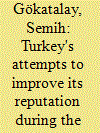

|
|
|
|
|
| Summary/Abstract |
Making use of archival material and newspapers, this article argues that Turkish concerns over reputation played a central role for Turkey in the making of the post-War Turkish-American rapprochement. Both government and opposition parties in Turkey as well as Turkish journalists, diplomats and students who were studying in the United States waged a campaign to make Turkey appear to be a reputable, modern, and civilized ally of the United States. Establishing an information bureau in New York, trying to prevent the exhibition of American movies that misrepresented Turkey and gladly hosting American journalists who visited Turkey, Turkish authorities tried to give the message that Turkey was under the Soviet threat and deserved to be included in the Marshall Plan.
|
|
|
|
|
|
|
|
|
|
|
|
|
|
|
|
| 20 |
ID:
188995
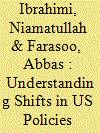

|
|
|
|
|
| Summary/Abstract |
The ‘war on terror’ produced discourses, which elevated terrorism as a primary threat to international peace and security and justified the overthrow of regimes that were suspected of supporting terrorism. After two decades, the United States (US) seeks to wind down the war, including through negotiations with groups that it once regarded as terrorist or complicit in terrorism. This article takes a critical approach to examine these shifts in US policy in relation to the Taliban in Afghanistan. It conceives the Taliban as a networked movement that consisted of local roots, transnational jihadist ties and connections to Pakistan’s proxy war in Afghanistan. The article then identifies and problematises key assumptions of American discourses by assessing them against local patterns of terrorism and (in)security and the Taliban’s violent tactics. Drawing on US sources, it finds that the US discourses shifted over time between various aspects of the Taliban movement as signifiers of its identity to justify shifting Washington’s priorities in Afghanistan. These discursive shifts, which reflected US policy priorities, introduced uncertainties and contradictions that contributed to the failure of the war efforts in Afghanistan.
|
|
|
|
|
|
|
|
|
|
|
|
|
|
|
|
|
|
|
|
|